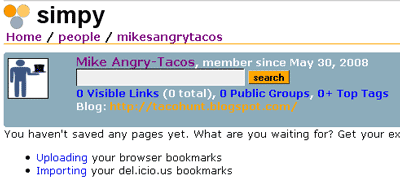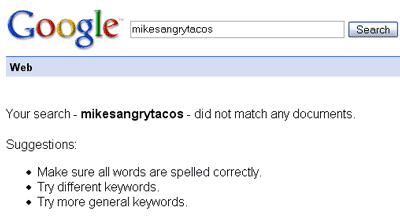
Getting Value From Social Media Links
This week we've got a quick and dirty Whiteboard Friday about how to make use of all of those social media profiles you've been building.
The trick: don't let them sit idle! You've got to network them a little in order for them to do you any good (read: links and rank).
SEOmoz Whiteboard Friday-Getting Value From Social Media Links from Scott Willoughby on Vimeo.
As a quick example, let's take a look at one of the sites from our social media directory - maybe... simpy.com. If we wanted to create a profile page there that would earn some link juice and ranking ability (and possibly pass some good juice back to our domain), here's the fairly standard procedure. BTW - I'll use the example of Mike, who's trying to help his taco blog - http://tacohunt.blogspot.com/ - rank for "mike's angry tacos." I just pulled it at random from the web, but it should work fine:
Step 1: Check to see if their pages get indexed
It seems obvious, but many times social sites might nofollow links to users' pages or they simply might not have enough link juice to make the user pages important enough to get into the engines' indices. We can use a simple search query like inurl:www.simpy.com/user to see. In this case, there's 778,000 results, so it looks like they're getting indexed pretty well.
Step 2: Create an optimized account
If I'm trying to promote http://tacohunt.blogspot.com/, and I want it to rank for "Mike's Angry Tacos," here's a good, optimized account:

I've got my user name as "mikesangrytacos" and my real name as Mike Angry-Tacos. I know, real creative, right?
Step 3: Participate Constructively
I might have a live link from my user profile page and even have a decent account page, but I'm going to need to contribute positively and effectively to the site if I want to build up enough internal link credits and karma to get this page into the search engines' indices. So...
- I start by uploading my browser bookmarks. I've now contributed 103 tags and pages to simpy, all of which will now have a link back to my profile page (although they're not particularly relevant to my goal since most of my links are SEO related).
- Next, I find some relevant groups to join by performing some searches for related topics like "food," "tacos" and "mexican." I found 3 relevant groups about recipes, cooking and food, so I join them - now I have links from each of those groups back to my profile page as well
- I find some popular tags on the tag page and start adding some of my links to those categories, which means I'll have my user profile linked-to from those tag pages (and they're only 2 clicks from the home page)
- I find some popular users, listed on the people page and identify items and groups we have in common and start sharing those items and joining their groups
- I go to the tag pages and find links that I like and add them to my account - now I'm listed on the pages for those links and become a "related user" to the people who've also chosen to bookmark those links
Step 4: Come back and consistently use the site
I'm not conducting a real campaign, so I probably won't do this, but if I wanted to, I'd install a simpy bookmarklet and try to tag a few new pieces of content every day for a week or two and add some groups and watchlists to my account. With time, I'd become a more popular user on the site and my account would be considered more important. As an experiment, though, I'm just going to leave it as is and see if Google picks up mikesangrytacos over the next couple weeks.

No results yet, but we'll try back in a couple weeks.
This process varies from one social site to another, but the principles are the same - creating good, useful, non-spammy accounts and connecting with other users and popular sections of the site in relevant ways. The more you add value to these sites, the happier they are to have you contributing, even if you're there mostly for marketing or SEO reasons. After all, a few hundred SEOs tagging content on their site in good ways is going to make them a better resource in the short-term and probably get more good content on their site that will bring in search traffic and visitors - it's a win/win!
The author's views are entirely their own (excluding the unlikely event of hypnosis) and may not always reflect the views of Moz.




Comments
Please keep your comments TAGFEE by following the community etiquette
Comments are closed. Got a burning question? Head to our Q&A section to start a new conversation.